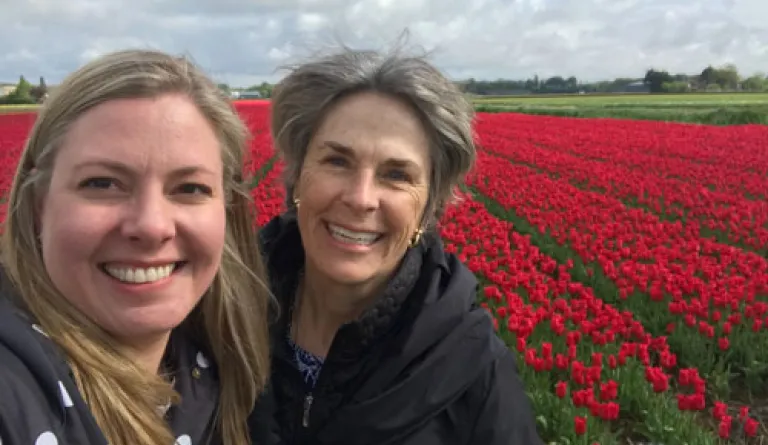World Justice Forum Brings Together Thought Leaders to Promote Justice at Home and Abroad

This week, IAALS Executive Director Rebecca Love Kourlis and Senior Director Brittany Kauffman have been attending the World Justice Forum at The Hague, which concludes today. They participated on panels addressing legal regulation and evidence-based family justice reform, and also showcased the work of IAALS’ Court Compass project, which has received an honorable mention as part of the World Justice Project’s World Justice Challenge 2019.
Judge Rebecca Love Kourlis, Brittany from Institute for the Advancement of the American Legal System and Sheila all Denver folks at The Hague for World Justice Forum. pic.twitter.com/Y6GDNTdh9S
— Sheila Hollis (@energylawgirl) April 29, 2019Realizing justice for all is at the heart of our work @IAALS. So excited to see so many from around the world here at the #WJForum and devoted to this goal. #JusticeforAll
— Brittany KT Kauffman (@bkaytk) April 29, 2019Court Compass launched in 2016 and focuses on simplifying and redesigning the divorce process in the United States. By working with self-represented litigants and other court stakeholders at our user-centric design sprints, IAALS listened to people who have been through our court system, identified the pain points they experienced, and developed recommendations for improving the divorce process. Michael Houlberg, a Manager at IAALS and a key contributor to the Court Compass project, is hopeful that the lessons that came from the Court Compass project can be of use across the world:
“While courts for some time now have been working to improve their processes for the betterment of users, users themselves are rarely, if ever, involved in these discussions. The collaboration between self-represented litigants and court stakeholders, fostered by the Court Compass design sprints, brought about the creation of innovative, practical solutions to some of the most commonly identified struggles that litigants face today in court. The courts we worked with were very excited about the recommended solutions that came out of these sprints, and I’m excited to see courts begin to implement these changes.”
The World Justice Forum has generated discussion around some of the most pressing legal topics in the world today. While much of the discussion is centered around achieving equal access to justice for all, speakers at the event are also addressing topics like family justice reform, public health, and the role of the private sector in closing the access to justice gap. Attendees are focusing on narrowing the equal access to justice gap in every aspect of life, even when it comes to topics like the environment and housing.
At the #WJForum Prof @ThuliMadonsela3 discusses her experiences building collaborations to achieve a socially just, inclusive society. We need data on the needs of people, and we need responsive solutions. Lawyers are key, other actors are needed also #justice4all #SouthAfrica pic.twitter.com/BQq4kaOe8r
— HiiL (@InnoJustice) May 1, 2019⚖️Two justice innovators we accelerate;
"There are other alternative models to Sillicon Valley models " - Dan Kass, https://t.co/AOTyCM4DPi
Asha Krishnan, @Haqdarshak: "We try to see whether you can apply technology to people's problems. There is a promise in tech."#WJForum pic.twitter.com/PSPC4E5S45
Much of the discussion has focused on the use of technology within the law, which is having a larger and larger impact on the legal world.
“Half the world is online. That is worth a pause all on its own.” Carlos Manjarrez @LSCtweets #WJForum
— Brittany KT Kauffman (@bkaytk) April 30, 2019Zack DeMeola, a Manager at IAALS, knows that this increase in access to legal technology and the internet will change the world as we know it.
“Technology is creating a whole new level of accessibility for people all over the world, and that is changing the dynamic for many who would otherwise be disenfranchised. Information that was previously hard to come by is now available online and at the touch of a finger. New applications in blockchain, messaging, and documentation technology, to name only a few, are allowing people to connect directly and without hassle, and machine learning is allowing for automation of previously time-intensive processes. So, people are turning to technology as the first step for finding services, shopping, learning, and communicating with each other. And because law touches on all aspects of people’s daily life—from family and health to housing and work—people are rightly pushing for technology to make legal advice, information, and services more accessible than ever before."
The energy that is building at the World Justice Forum is a sign that, globally, we not only recognize the issues and injustices facing vulnerable populations, but progress is possible. Natalie Knowlton, Director of Special Projects at IAALS, has seen firsthand how these conversations and advancements have the power to change the legal landscape as well as how people view the legal system:
“The World Justice Project has brought together justice system stakeholders and advocates from around the world who are all working, in various ways, to address a terrible reality: two-thirds of the global population does not have access to justice. This inaugural meeting of minds and hearts reminds of us both of the substantial work we have in front of us, to bridge gaps in justice around the world, but also of the truly global team that is assembled and working alongside our cause here at IAALS.”
